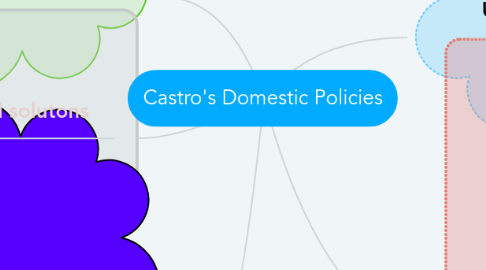
1. 3.The INRA, nationalization and land reform
1.1. Castro was keen to implement reforms to improve the lives of peasants
1.1.1. Reforms included nationalizing major industries, reducing rents
1.2. Land was confiscated from large companies and then redistributed to peasants.
2. 4.Social Problems and solutons
2.1. Catro made it illegal to discriminate against people based on gender or race
2.1.1. Prejudice was still permitted in the area of sexuality.
2.2. After taking power in January 1959, Castro silenced anti-revolutionary media.
2.2.1. He promised that this measure will be revoked shortly, which never happened.
3. 5.The Special Period In Time Of Peace 1989-2000
3.1. By 1989 80% of both Cuban exports and imports came from USSR.
3.1.1. The collapse of USSR had an enormouse impact on Cuba
3.1.2. The effects lasted until 1996, but Castro's Cuba survived, due to:
3.1.2.1. 1.The absence of an organized and effective opposition
3.1.2.2. 2.The army's utter loyalty to Castro
3.1.2.3. 3.Disloyalty to Castro being a punishable offense
3.1.3. In 1990 "Food Programme" was launched which encouraged farmers to increase the food supply.
3.1.3.1. Mass mobilization of unemployed students and other volunteers to work in plantations
3.1.3.2. A growth in tourism-related ndustries.
3.1.3.3. By mid-1990s Castro allowed US dollars to be used as currency.
3.1.4. Castro was also forced to introduce capitalist elements to the cuban economy.
3.2. In 1996 Us passed the Helms-Burton Act
3.2.1. This act penalised foreign companies doing business in Cuba which dissuaded them from investing in Cuba.
3.3. Even in crisis, Universal Health Care and universal education were present.
4. 1.Economic relations with USSR
4.1. After 1960 Cuba shifted it's economic reliance from USA to USSR
4.1.1. Cuba only declared itself a communist state after the Bay of Pigs invasion in November 1960
4.2. The Cuban Missile Crisis in October 1962 spoiled this relationship.
4.2.1. Castro felt like USSR has been using Cuba in power play with USA while disregarding the needs of the cubans
5. 2.Economic Problems and Solutions
5.1. Prior to Castro's victory, the CUban economy was suffering unfavourable trade conditions with the USA.
5.2. Before the revolution, unemloyment in Cuba had been high.
5.2.1. The work of the Peasants was back-breaking and low-paying.
5.2.2. Castro's policies changed this and peasants were paid more fairly while working less hours.
5.2.3. Production however fell in some areas since Castro's policies removed the incentive for people to work hard.
5.3. In 1970s Cuba started liberalizing it's economy, but by 1985 Castro decided that liberalization had gone too far.
5.3.1. In 1986 Rectification Cmpaign was launched which was intended to move the economy back towards a centrally planned one.
